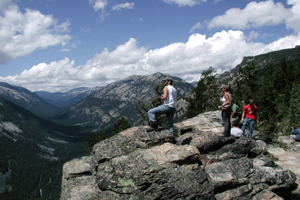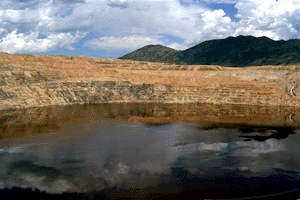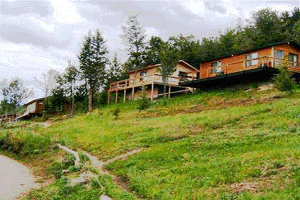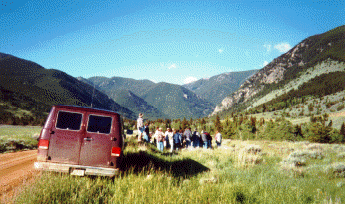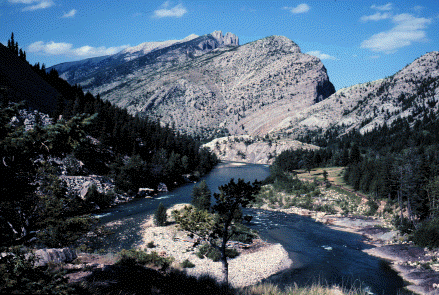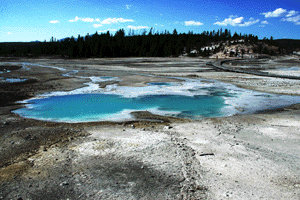Main Content
Field Camp
Get Hands on Experience in Montana and Wyoming
Not many degrees require a six-week summer trip to Montana, but field training is critical for many careers in Geology. Every student earning the Bachelor of Science in Geology is required to attend this field camp excursion, which takes place primarily in the Beartooth Mountains of south-central Montana.
Students traditionally attend field camp during the summer between their junior and senior year. The six-week period is divided into several exercises that address a range of geological topics, including sedimentary geology, stratigraphy, paleontology, geomorphology, structural geology, tectonics, igneous and metamorphic petrology, glacial geology and economic geology. Most importantly, students learn how to operate safely and efficiently as field geologists.
The class spends about 60% of the 6-week summer camp at the Yellowstone-Bighorn Research Association (YBRA) field station near Red Lodge, Montana (www.ybra.org). Its excellent permanent facilities include cabins, wash houses, study halls, and a lodge/dining room - home of outstanding family-style meals. We also work out of the University of Montana-Western (UM-W) at Dillon for seven days. Camping is limited to about 11 days during road trips.
Why take a course in field geology?
Well, maybe your department, a grad school, or a future employer requires you to take one. If not, there are still good reasons to have a summer field course under your academic belt. Field geology offers students the opportunity to apply what has been learned in the classroom to real geological problems. Unless you already have fairly extensive field experience you should emerge from the course with a much deeper and more realistic appreciation of problems related to the collection, analysis, interpretation, and synthesis of geological information.
In the field, rocks look different than they do in textbooks or on lab benches. A valuable aspect of the field course is practice in approaching an outcrop and knowing what to do next. Even an incorrect solution to a field problem or a faulty interpretation of a geological event is of value because it prepares the way for a better solution or interpretation next time. As you get better at your job through practice, you gain confidence in your abilities. For this reason, a field course must stress individual effort and personal initiative. Students usually work in teams, primarily for safety, and we all realize that a good deal of learning can be derived from discussing ideas with classmates. But it is your own interpretation of the geology, developed from your own investigation, that will be of the most value.
What are the prerequisites?
Field camp participants must have completed courses in physical and historical geology, igneous and metamorphic petrology, structural geology, and stratigraphy. Course experience in sedimentology and geomorphology is recommended but not required. Most students take our field course between the third and fourth (junior and senior) years or during the final summer prior to graduation.
We work in - and see - a lot of great geology
From our Red Lodge and Dillon headquarters we map in Archean to Cenozoic material ranging from high-rank metasediments and ultramafics to marine and terrestrial sedimentary rocks. Map areas around Red Lodge best illustrate Laramide thick-skinned structural styles, whereas those around Dillon emphasize classic thin-skin tectonic style. We reconstruct Pleistocene glacial events from our own field maps, interpret stream capture sequences along the Beartooth Front, and apply first-hand observation to depositional problems in the Bighorn Basin. On a major excursion from Red Lodge, we travel through Yellowstone National Park, up the west side of the Sawtooth Mountains into Glacier National Park, and return to Red Lodge across the western edge of the northern plains.
Start & End Dates for Summer 2026: June 14 to July 26, 2026.
- Instruction officially begins at the YBRA camp on Monday, June 15, 8:00 a.m.
- Instruction officially ends in Grand Junction on Sunday, July 26, 8:00 p.m.
- Please book your return flights for Monday, July 27, 2026. *see information below
Sally Potter-McIntyre and James Conder
We are now accepting applications for 2026 Field Camp
How to apply:
Please download and fill out and sign the application pdf form (4 pages), and then e-mail the completed pdf form back to the field course director (contact below):
Field Course Director
Dr. Sally Potter-McIntyre
pottermcintyre@siu.edu
LOGISTICS AND TRANSPORTATION
Students have two transportation options:
- Fly to Billings airport, Billings, MT and meet us before 6/14/2026 at 3:00 p.m. in the Billings airport restaurant. Please make your air travel bookings in advance. Transportation to the field station in Red Lodge, MT will be organized in 8-passenger vans by SIU.
- Meet us directly at the YBRA field station, in Red Lodge, MT (https://www.ybra.org/).
Students who would like to get a ride from Carbondale to Red Lodge:
SIU does provide transportation to all students who meet us in Carbondale the day before departure.
We advise students to arrive in Carbondale no later than the Friday preceding departure at 10:00 p.m., spend the night in Carbondale and meet us in front of the Department of Geology (Parkinson Lab) at 1259 Lincoln Drive on the Saturday day of departure at 2:45 a.m. You may drop your bags in the Department if you arrive on Friday before 4:30 p.m.




